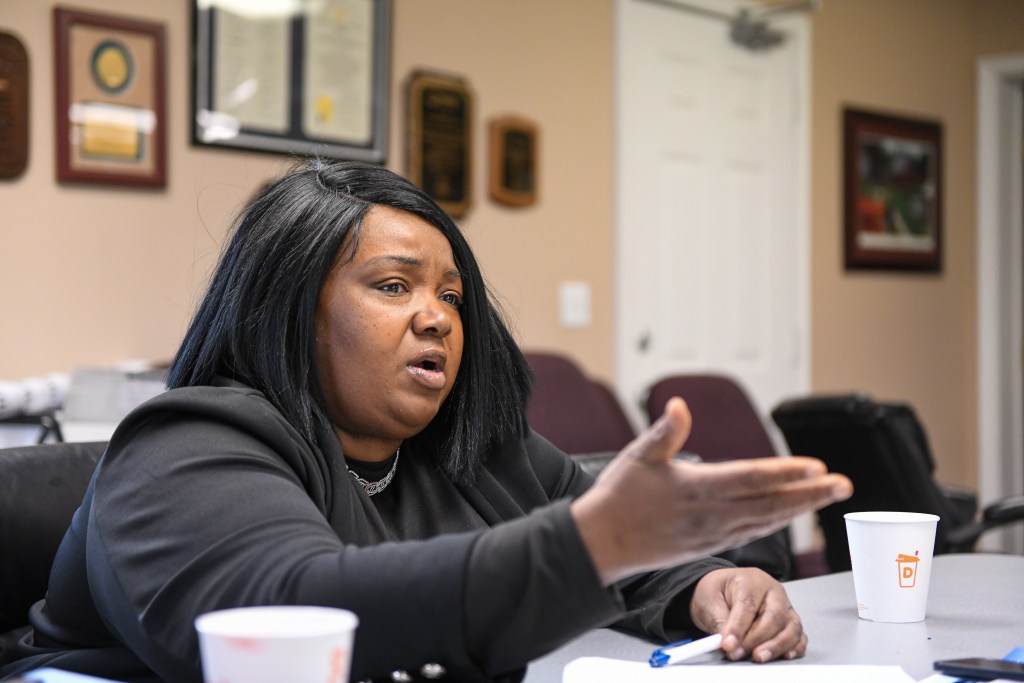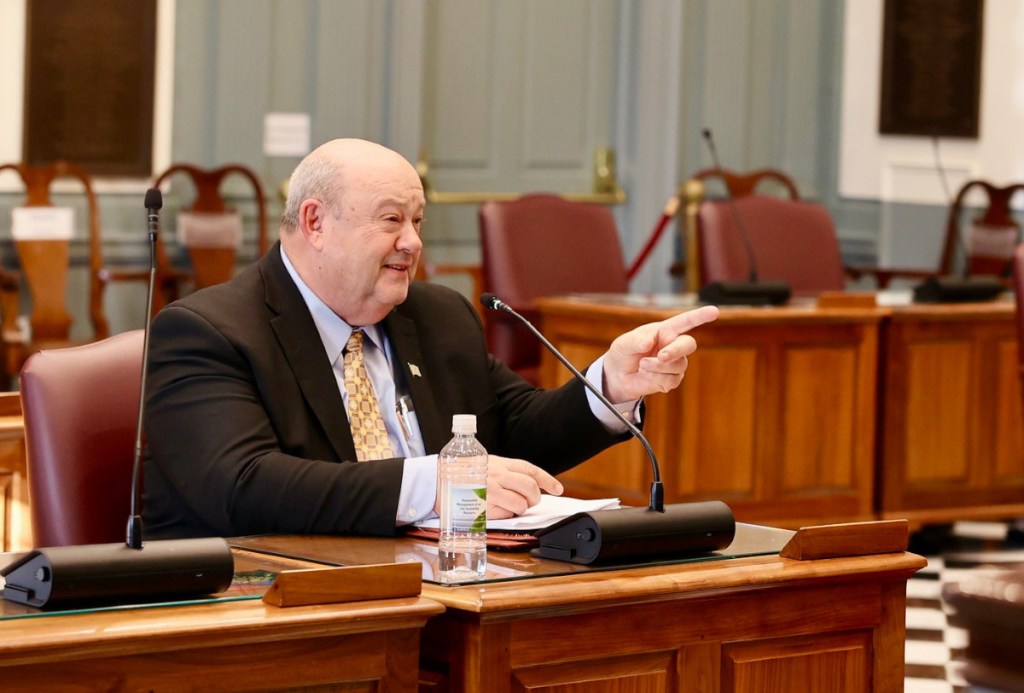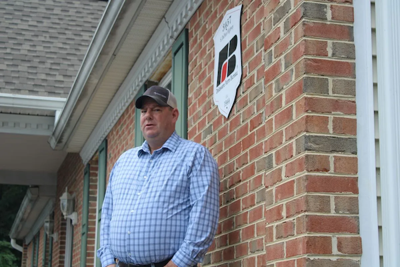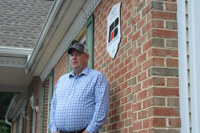This story was developed following discussions with the public at a Spotlight Delaware listening session. Find out more about our Listening Tour by clicking here.
Editor’s Note: This story contains discussions of suicide. If you or someone you know is in crisis call or text 988 to the Suicide & Crisis Lifeline, 24/7.
Steve Breeding, a fourth generation farmer in Seaford, calls himself the “sheep guy.” But last year, Breeding almost took his own life after his barn burned to the ground, killing his sheep and calling that identity into question.
Breeding said he was at Baltimore/Washington International Airport when he got a call from his neighbor, telling him the barn had burned. He raced home to Seaford – clearing a normally hour-and-45-minute car ride in just 45 minutes.
But when he got there, it was too late. All the sheep had died.
For nearly a week after, he cleared the remnants of the barn and the bodies of nearly 200 sheep on an excavator.
“It’s been a week, tears running down my face,” Breeding said. “But everybody says, ‘Oh, don’t, don’t tell anybody. Go deal with it.’”
That mentality nearly boiled over one afternoon on a lunch break, as he sat in his truck with a handgun, contemplating suicide. Then, in what he called a moment of “divine intervention,” something caught his attention on the dashboard. It was a card with the number to a suicide crisis hotline.
Breeding called the number, and had a conversation that changed his life. Today, he is vice president of the Delaware Farm Bureau and is on a “crusade” to bring conversations about mental health to farmers.
There’s all kinds of negative forces that can be compounded, piled on top of one another, and it’s easy for someone to come to the conclusion that there’s no way out. But I’m convinced there is always a way out.
Delaware ag Secretary don clifton
According to the National Rural Health Association, farmers are three-and-a-half times more likely to take their own lives compared to the general public. Breeding pointed to the isolation of the job, as well as the gamble year-to-year on their crops, that particularly put them at risk.
In recent years, farmer outreach for mental health increased across the state. Yet little data is collected in Delaware on farmer suicide to demonstrate how effective these programs are, and if farmers are benefiting.
According to the state Agriculture Department, it does not collect data on incidences of farmer suicide, making it difficult to track progress in real time.
Earlier this month, the Delaware Farm Bureau and state Department of Agriculture launched an awareness campaign with the suicide prevention hotline printed onto stickers for farmers to place on their tractors or other visible spots.
Two years ago, the Delaware Farm Bureau also received a $5,000 grant from the American Farm Bureau Federation for outreach campaigns.
Breeding said he believes the resources exist for farmers, but there’s a struggle getting that information into their hands. He added that many farmers have a “fix it now” mentality, but in cases surrounding mental health, those issues can’t be fixed overnight.
“That’s not the sexy part of farming,” Breeding said, referencing mental health issues.
 Leandra Casson, a cooperative extension trauma and wellness coordinator at Delaware State University, has been spearheading efforts to extend suicide prevention resources in Delaware. | SPOTLIGHT DELAWARE PHOTO BY JOHN MOLLURA
Leandra Casson, a cooperative extension trauma and wellness coordinator at Delaware State University, has been spearheading efforts to extend suicide prevention resources in Delaware. | SPOTLIGHT DELAWARE PHOTO BY JOHN MOLLURAFor Leandra Casson, the wellbeing of farmers is personal. As the granddaughter of a poultry farmer in Kent County, she’s passionate about the close-knit bond that farming families have, as well as the self-sufficiency it creates.
Casson, a cooperative extension trauma and wellness coordinator at Delaware State University, said she wants to support farmers, who contribute so much to society.
But last year, Casson attended trainings at the U.S. Department of Agriculture, where she said she learned about the heightened suicide rates for farmers. This, she said, upset her and pushed her to spread awareness about farmer burnout.
“Studying all of that really made me passionate about trying to get people to think it’s important No. 1, but then two, put some dollars behind making sure that we can make a difference in this space, because we’re really lacking in that,” Casson said.
If farmer mental health isn’t addressed, it’s possible to see more deaths and injuries, Casson said. A 2022 report from the U.S. Department of Agriculture classified farming as “the most dangerous” sector in 2019 based on emergency room visits and workplace deaths.
This comes as farmers face a sharp increase in demand for crops and livestock by 2050, as the population continues to grow.
To better support farmers, Casson said, people can shop for local produce or volunteer at local farms to show they care. From a policy perspective, Casson said lawmakers could fund more programs that improve health care access for farmers, as well as educational programs surrounding mental wellbeing.
“And we need to gather data about incidents of injury, suicide and substance abuse by profession,” Casson said. “Currently, that is not the case.”
 Delaware Agriculture Secretary Don Clifton agreed that more data was needed on the mental health needs for state farmers. | PHOTO COURTESY OF DELAWARE SENATE DEMOCRATS
Delaware Agriculture Secretary Don Clifton agreed that more data was needed on the mental health needs for state farmers. | PHOTO COURTESY OF DELAWARE SENATE DEMOCRATSDelaware Agriculture Secretary Don Clifton, who is a lifelong Sussex County farmer and former Farm Bureau executive director, echoed that statement. Measurements of success up to this point, he said, have been primarily anecdotal.
One struggle when it comes to outreach is that farmers are very private by nature, Clifton said.
This makes it difficult for farmers to come forward to admit they may be struggling or that the stresses of farming may be piling up in their lives. But he said people like Breeding, who have shared their own struggles with farming and mental health, is an example of that success.
Clifton shared his own experiences with losing his brother in a farming accident, as well as facing financial stresses on the family farm during the 1980s.
As a third-generation farmer, Clifton said he didn’t have access to mental health resources throughout his career. He said people didn’t come to check on farmers, and that most issues were resolved within the family.
In his case, he said the impacts of the stress around his work became “almost debilitating.” But he said the goal of new outreach programs is to let farmers know they can reach out for help “before things reach the point where they may do something extreme.”
“There’s all kinds of negative forces that can be compounded, piled on top of one another, and it’s easy for someone to come to the conclusion that there’s no way out,” Clifton said. “But I’m convinced there is always a way out.”
(Spotlight Delaware is a community-powered, collaborative, nonprofit newsroom covering the First State. Learn more at spotlightdelaware.org).











(0) comments
Welcome to the discussion.
Log In
Keep it Clean. Please avoid obscene, vulgar, lewd, racist or sexually-oriented language.
PLEASE TURN OFF YOUR CAPS LOCK.
Don't Threaten. Threats of harming another person will not be tolerated.
Be Truthful. Don't knowingly lie about anyone or anything.
Be Nice. No racism, sexism or any sort of -ism that is degrading to another person.
Be Proactive. Use the 'Report' link on each comment to let us know of abusive posts.
Share with Us. We'd love to hear eyewitness accounts, the history behind an article.